2000 年上海外国语大学英语语言文学考研真题
I. Cloze (20%)
Fill in each blank with a word or phrase that is grammatically and semantically
appropriate.
Please write your answers on the answer sheet.
Acts of sabotage are very important. It is necessary to distinguish (1)______ between
sabotage, revolutionary- and highly effective method of warfare, and terrorism, a
(2)_______ that is generally ineffective and indiscriminate in its results, (3)_____
it often makes victims of innocent people and destroys a large number of lives that
would be valuable to the revolution.
Terrorism should be considered a valuable tactic (4)_____ it is used to put to death
some noted leader of the oppressing forces well known for his cruelty, his efficiency
in repression, (5)_____ any other quality that makes his (6)___ useful. (7)____ the
killing of persons of small importance is never advisable, (8)______ it brings on
an increase of reprisals, including deaths.
There is one point very much in controversy in opinions about terrorism. Many
consider that its use, by provoking police repression, hinders (9)____ more or less
legal or semi-clandestine contact with the masses and makes impossible unification
for actions that will be necessary at a critical moment. This is correct; but it
(10)_____ happens that in a civil war the repression by the governmental power in
certain towns is already- so great that, in fact, every type of legal action is
suppressed (11)______, and any action of the masses that is not supported by arms
is (12).____. It
is (13)______ necessary to be circumspect in adopting methods of this type and to
consider the consequences that they may bring for the revolution. (14)____,
well-managed sabotage is always a very effective arm, (15)_____ it should not be
employed to put means of production out of action, leaving a sector of the population
paralyzed (and thus without work) (16) _____ this paralysis affects the normal life
of the society. It is ridiculous to carry out sabotage against a soft drink
factory, (17)_____ it is absolutely correct and advisable to carry out sabotage
against a power plant. In the (18)_______case, a certain number of workers are put
out a job but (19)_____ is done to modify the rhythm of industrial life; but this
is entirely justified by the paralysis of the life of the (20)_____.
II. Sentence Matching (20%)
Match a sentence in the left column with one in the right column. The sentences to
be paired up should be coherent in meaning. Please write your answers on the answer
sheet. In nursery lore
a verse or tradition, learnt
1. in early childhood, is not usually passed on again until the little listener has
grown up, and has children of his own
�
2. The other problem that arises from the employment of women is that of the working
wife.
3. The. male initiative in courtship is a pretty indiscriminate affair, something
that is tried on with any remotely plausible woman who comes within range and, of
course, with all degrees of tentativeness.
4. Into this happy world the nineteenth century, brought two new facts: the
breech-loading rifle and the British Government.
5. As the embodiment of majesty and earthly power, Louis was popular.
6. Australia has also given great attention to recruiting people elsewhere.
7. The gorilla is something of a paradox in the African scene. One thinks one knows
him well.
8. The government’s avowed aim, however, is to maintain“a substantially homogeneous
society into which newcomers, from whatever sources, will merge themselves”.
9. The form of attack of a guerrilla army is also different.
10. There are a good man), objective pieces of evidence for the erosion of men’
s status.
A. By and large, therefore. Australia still prefers British migrants, and tends to
be rather less selective in their case than it is with others.
B. The period between learning a nursery rhyme and transmitting it may be anything
from twenty to seventy years.
C. It has two aspects; that of the wife who is more of a success than her husband
and that of the wife who must rely heavily on her husband for help with domestic
tasks.
D. The French were delighted with him, and other European peoples were impressed.
E. What decides the issue of whether a genuine courtship is going to get under way
is the woman’s response. Yet the fact is we know very little about them. G, The
first was an enormous luxury and blessing; the second, an unmitigated nuisance.
H. They decided that the country had an excellent potential source of applicants
among the so-called “guess workers” who have crossed their own frontiers to work
in other parts of Europe.
I. In the first place, there is the widespread postwar phenomenon of the woman Prime
Minister, in India, Ceylon and Israel.
J. Starting with surprise and fury, irresistible, it suddenly converts itself into
total passivity.
✫
Supplying the Missing Parts (10%)
There are two parts omitted in this short essay. They can be either a paragraph or
sentences.
Supply the missing parts so that the whole essay forms a unified whole. Please write
them on the answer sheet
Thumbing a Lift
[the missing part]
To fulfill the first requirement you must have some mark to distinguish you at once
from all other hikers. A soldier, for instance, should wear his uniform. In a foreign
�
country an unmistakable indication of your own nationality will also arrest a driver’
s attention.
When l hitchhiked 9500 miles across the United States and back recently I wore a
well-tailored suit, a bowler hat and a trench coat, and carried a pencil-thin rolled
black umbrella.
My suitcase was decorated with British flags. Having plenty of luggage, moreover,
I was not likely to be suspected of being a dangerous lunatic. I then had to get
across to the driver the idea that I was a real traveller, and needed to get somewhere
cheaply.
But even with careful preparation, you must not assume that the task will be easy.
You should be prepared to wait a little, for there are drivers who confess to a fierce
prejudice against, not to say hatred of, hitch-hikers, and would no more pick up
a hiker than march from London to Manchester. In America, my average wait was half
an hour, and my longest two hours, but I have heard of people waiting all day; they
presumably took less pains to make themselves conspicuous.
[the missing part] On one occasion I found myself driving with two boys of about
nineteen who turned out to be on the run from the police, and were hoping to use
me as an alibi: There are also lesser risks: you may find yourself in the car of
a religious fanatic, or just a bad driver. You cannot tell, of course, until you
are in the car. But you soon learn .the art of the quick excuse that
gets you out again.
If the hitchhiker in the US will remember that he is seeking the kindness of drivers
to give
him a free ride, and is prepared to give in exchange entertainment and company,
instead of going
to sleep, he will come across the remarkable, almost legendary, hospitality of the
American of the
West. It will also help if he can drive – I think that I drove myself about 4500
of those 9500 miles
I hitchhiked in the States.
IV. Reading Comprehension (20%)
There are FOUR passages with a total of 20 multiple-choice questions. Read the
passages
carefully and then choose the ONE correct answer. Please write your answers on your
answer
sheet.
Text A
An active-minded woman of the early nineteenth century was sometimes not content
to confine her interest and labour to her husband and children. Her surplus energies
found their most easily available and socially approved outlet in some kind of
charitable and religious work, since everyone assumed that women are soft-hearted,
humane, and pious, with strong religious leanings. A lady could easily find outlets
in such obvious activities as decorating the pastor’s study, carrying baskets to
the poor, sewing for missionaries, or taking flowers to the sick. On a slightly more
�
impersonal basis, she might work in one of the many philanthropic movements of
the period. She might attend inspirational meetings, and help to raise funds, as
by a bazaar, for such good causes as consoling prisoners, helping the aged, or
providing for widows. Greatest sentimental interest seemed to go to orphans.
Alternatively, instead of using her spare time in alleviating suffering, the
energetic lady might harness her enthusiasm in support of one of the many crusades
designed to improve society.
1. With what subject is the passage mainly concerned?
(A) Women and the church in the nineteenth century.
(B) The relationship between poverty and politics.
(C) A historical perspective of politics.
(D) Activities and interests of 19%century women.
2. According to the passage, why did some women devote much of their time to charity?
(A) Impoverished people requested their help.
(B) They wanted to be more than homemakers.
(C) They were not interested in reading.
(D) Their ministers sought their assistance.
3. According to the passage, most women in the nineteenth century, were thought to
be
(A) poor and sickly.
(B) angry and rebellious.
(C) religious and humanitarian.
(D) timid and helpless.
4. Which of the following can be inferred about the women described in the passage?
(A) They” were poor and needed work to help support their families.
(B) They were middle-class and were looking for money to pay for luxuries.
(C) They had enough money and generously donated their time and efforts.
(D) They would have preferred working full-time to alleviating suffering.
5. The passage mentions all of the following as good deeds performed by women EXCEPT
(A) travelling abroad as ambassadors for their country.
(B) giving support and comfort to orphans.
(C) making ministers’ offices more attractive.
(D) helping women whose husbands died.
Text B
At birth, the infant has only the most elementary emotional life. Newborns show an
expression of disgust, for example, in response to strong tastes, and show surprise
in reaction to sudden change. They also show interest, which developmental
psychologists consider an emotion in its own right.
By ten months, infants display the full range of what are considered the basic
emotions: joy, anger, sadness, disgust, surprise, and fear. The emergence of the
basic emotions during the first year or two of life seems to be programmed by a
biological clock for brain development. As the appropriate brain maturation occurs,
the various emotions appear in an infant’s repertory. For example, studies of brain
activity in ten-month-olds show that the right frontal regions are more active during
�
positive emotions, and the left during negative emotions.
6. Which of the following is the best title for the passage?
(A) Measuring Infant Intelligence and Brain Development.
(B) Brain Maturation and Emotional Growth in Infants.
(C) Stimulating the Development in Infant Emotions.
(D) Positive and Negative Emotions in Infants.
7. The phrase “in its own right” is closest in meaning to which of the following?
(A) Legally.
(B) In fact.
(C) In itself.
(D) On the other hand.
8. In the second paragraph, the author uses the analogy of a clock to emphasize which
of the following generalizations about infants’ emotional behaviour?
(A) It emerges rapidly.
(B) It has a complex pattern.
(C) It develops with predictable regularity.
(D) It may change from one minute to the next.
9. Which of the following statements about ten-month-old infants is best supported
by the passage?
(A) Their various emotional responses are difficult to discriminate.
(B) Their emotional range is wider than that of newborns.
(C) Their behaviour is affected only by positive emotions.
(D) Their brain activity is greater when they are happy.
10. The ideas in the passage are divided into two paragraphs in order to contrast
(A) emotional development at two stages of infancy.
(B) two areas of the brain involved in emotional development.
(C) the development of two emotions in infants.
(D) two methods of measuring emotional development.
Text C
SOMETHING ABOUT NAPLES just seems made for comedy. The name alone conjures up
pizza, and lovable, incorrigible innocents warbling “0 Sole Mio”; a nutty, little
comer of the world where the id runs wild and the only answer to the question “Why?”
appears to be “Why not?”
Naples: the butter-side-down of Italian cities, where even the truth has a strangely
fictitious tinge. One day a car rear-ended one of the city’s minibuses. The bus
driver got out to investigate.
While he stood there talking, his only passenger took the wheel and drove off. Neither
passenger nor bus was ever seen again.
Then there was that busy lunch hour in the central post office when a crack in the
ceiling opened and postal workers were overwhelmed by an avalanche of stale
croissants. As the cleaners hauled away garbage bags of moldy breakfast rolls, the
questions remained: Who’? Why? And what else could still be up there?
But Naples actually isn’t so funny. Italy’s third largest city,, with 1.1 million
people, has a much darker side, where chaos reigns: bag snatching and mugging,
�
clogged streets of stupefying confusion, where traffic moves to mysterious laws of
its own through multiple intersections whose traffic lights haven’t functioned for
months, maybe years - if they have lights at all. Packs of wild dogs roam the city’
s main park. Nineteen policemen on the anti-narcotics squad are arrested for
accepting payoffs from the Camorra, the local Mafia.
To many Italians, particularly those in the wealthy, industrialized north, none
of this is surprising. To them Naples means political corruption, wasted federal
subsidies, rampant organized crime, appallingly large families, and cunning, lazy
people who prefer to do something shady rather than honest work..
Nepolitans know their reputation. “People think nothing ever gets done here,”
said a young professional woman. “Sometimes they say, ‘Surely you come from Milan.
You come from
Naples? Naples?”
Giovanni del Forno, an insurance executive, told me about his flight home from a
northern Italian city, the plane waited on the tarmac for half an hour for a gate
to become available. “And I began to hear the comments around me: ‘Well, here we
are in Naples,’” he said with a wince.
“These comments make me suffer.”
Neapolitans may complain, but most can’t conceive of living anywhere else. The
city has the intimacy, tension, and craziness of a large but intensely devoted family.
The people have the same perverse pride as New Yorkers. They love even the things
that don’t work, and they. Love being
Neapolitans. They know outsiders don’t get it, and they don’t care. “Even if you
go away”, one woman said, “you remain a prisoner of this city. My city has many
problems, but away from it I feel bad.”
This is a city in which living on the brink of collapse is normal. Naples has survived
wars, revolutions, floods, earthquakes, and eruptions of nearby Vesuvius. First a
wealthy colony founded by the Greeks (who called it Neapolis, or “new city”), then
a flourishing Roman resort it lived through various incarnations under dynasties
of Normans, Swabians Austrians, Spanish, and
French, not to mention a glorious period as the resplendent capital of the Kingdom
of the Two
Sicilies.
It was a brilliant, cultivated city that once ranked with London and Paris. The
Nunziatella, the oldest military school in Italy, still basks in its two centuries
of historic glory; the Teatro San Carlo
remains one of the greatest opera houses in the world. The treasures of Pompeii grace
the National Museum. Stretched luxuriantly between mountains and sea along the
curving coast of the
Bay of Naples, full of ornate palaces, gardens, churches, and works of art, with
its mild climate and rich folklore, Naples in the last century was beloved by artists
and writers. The most famous response to this magnificence was the comment by an
unknown admirer, “See Naples and die.”
Today that remark carries less poetic connotations. The bombardments of World War
�
II were
followed by the depredations of profiteers and politicians-for-rent who reduced the
city to a
demoralized shadow of itself, surviving on government handouts, Until five years
ago city
governments were cobbled together by warring political factions; some mayors lasted
only a few
months. A cholera outbreak in 1973 was followed in 1980 by a major earthquake. Its
famous
port has withered (though the U.S. Sixth Fleet command is still based just up the
coast), industries
have failed, tourists have fled, natives have moved out - it seems that only drug
trafficking is
booming. “Unlivable,” the Neapolitans say. “Incomprehensible”. “Martyred”.
11. The two examples in the second and third paragraphs intend to show that
(A) Naples has a high incidence of traffic accidents.
(B) anything extraordinary can happen in Naples.
(C) people there love to store food for years,
(D) everything appears to be on the wrong side.
12. The following words are appropriate to describe traffic conditions in Naples
EXCEPT
(A) disorder.
(B) overcrowding.
(C) insecurity.
(D) inefficiency.
13. It can be concluded from the passage that the Northerners
(A) are critical of what Naples represents.
(B) sympathize with Neopnlitans.
(C) share many things with Neopolitans.
(D) make every effort to shun Neopolitans.
14. The author implies that Neopolitans’ affection for the city
(A) was unrealistic.
(B) went a bit too far.
(C) was extraordinary.
(D) gave rise to concern.
15. When the author says “‘Today that remark carries less poetic connotations,”
he actually
means that
(A) the city can now boast very few poets.
(B) artists and writers have left for London and Paris.
(C) the city underwent heavy, bombing during the War.
(D) The city’s present problems obscured its glorious past.
Text D
Laymen suspect that because colds are self-limiting, short, non-fatal infections,
doctors do
�
not take them very seriously. Nobody will think this after reading Sir Christopher
Andrewes’s
book.
An American survey has shown that each year every employed person loses three to
four
working days from colds and allied complaints, and every school child loses five
to six days of
schooling. Colds waste more time than strikes. The conquest of the common cold is
therefore a
thoroughly worthwhile ambition.
Until 1961 Sir Christopher Andrewes was in charge of the Medical Research Council’
s
Common Cold Research Unit at Salisbury, and he writes as one of the world’s experts
when he
describes the patience, the frustrations, the ingenuity and occasional flashes of
true scientific
genius which have characterized the careers of the workers who have set out to tackle
what has
turned out to be a real brute of a problem.
The great killing infections like syphilis or poliomyelitis are each caused by one
specific
micro-organism, or, at worst, a small group of closely related parasites. By contrast
it has slowly
become apparent that the common cold is not a disease but a large group of similar
diseases,
caused possibly, by anything between fifty and one hundred different organisms.
Much of Sir Christopher’s book is taken up by an account of the struggle to identify,
the
germs which do cause colds. At first it was thought that bacteria were responsible
because
certain bacteria are commonly found in the noses and throats of cold victims. The
first evidence
that a virus might be concerned was obtained in 1914 when Dr. W. Kruse of the Hygienic
Institute
of the University of Leipzig took some of the discharge from the nose of an assistant
with a cold
in the head, diluted the discharge in saline, and then passed it through a filter
with pores too small
to permit the passage of bacteria. Drops of the filtrate were put into the noses
of twelve other
members of the staff and four of them developed colds within a day or so.
Since that time thousands of volunteers have subjected themselves to similar
experimental
infections, and for early twenty years most of such work has been done at Salisbury
�
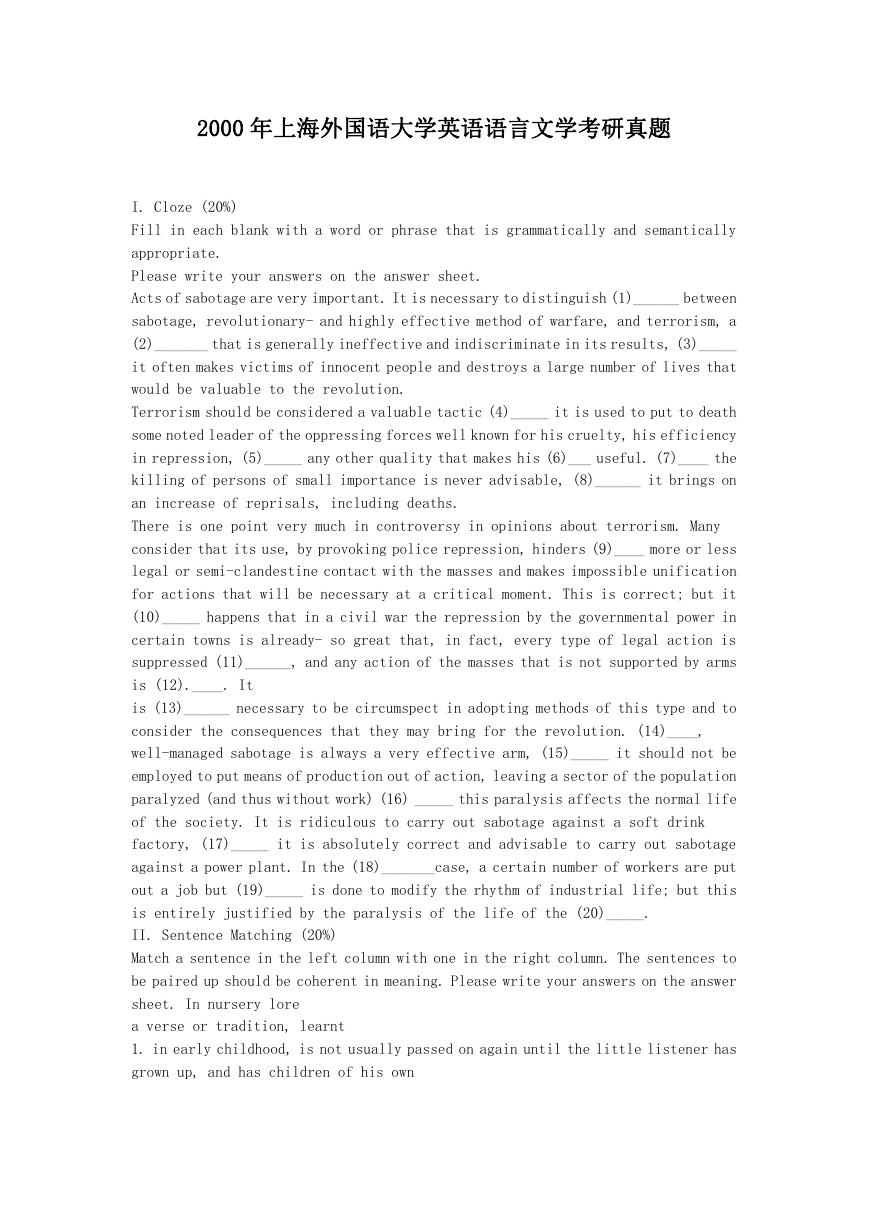

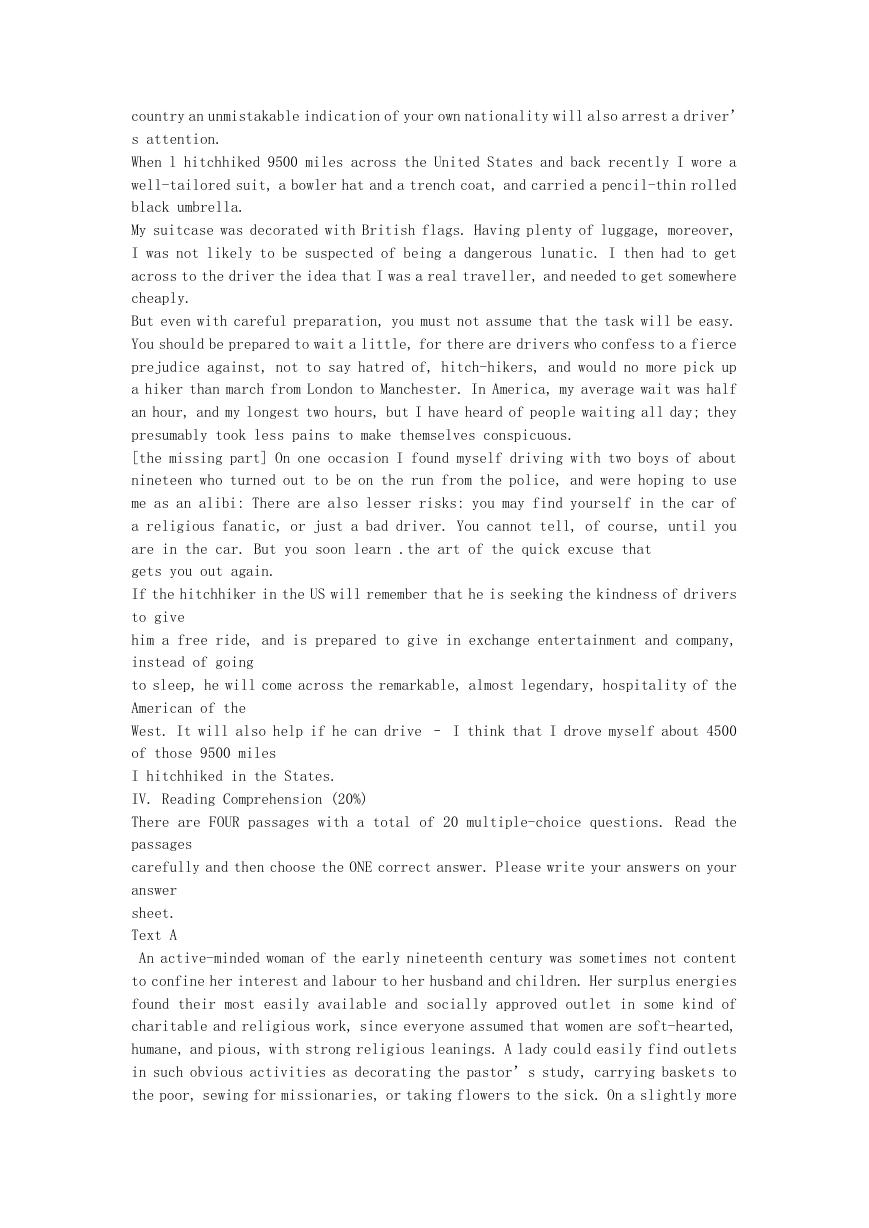
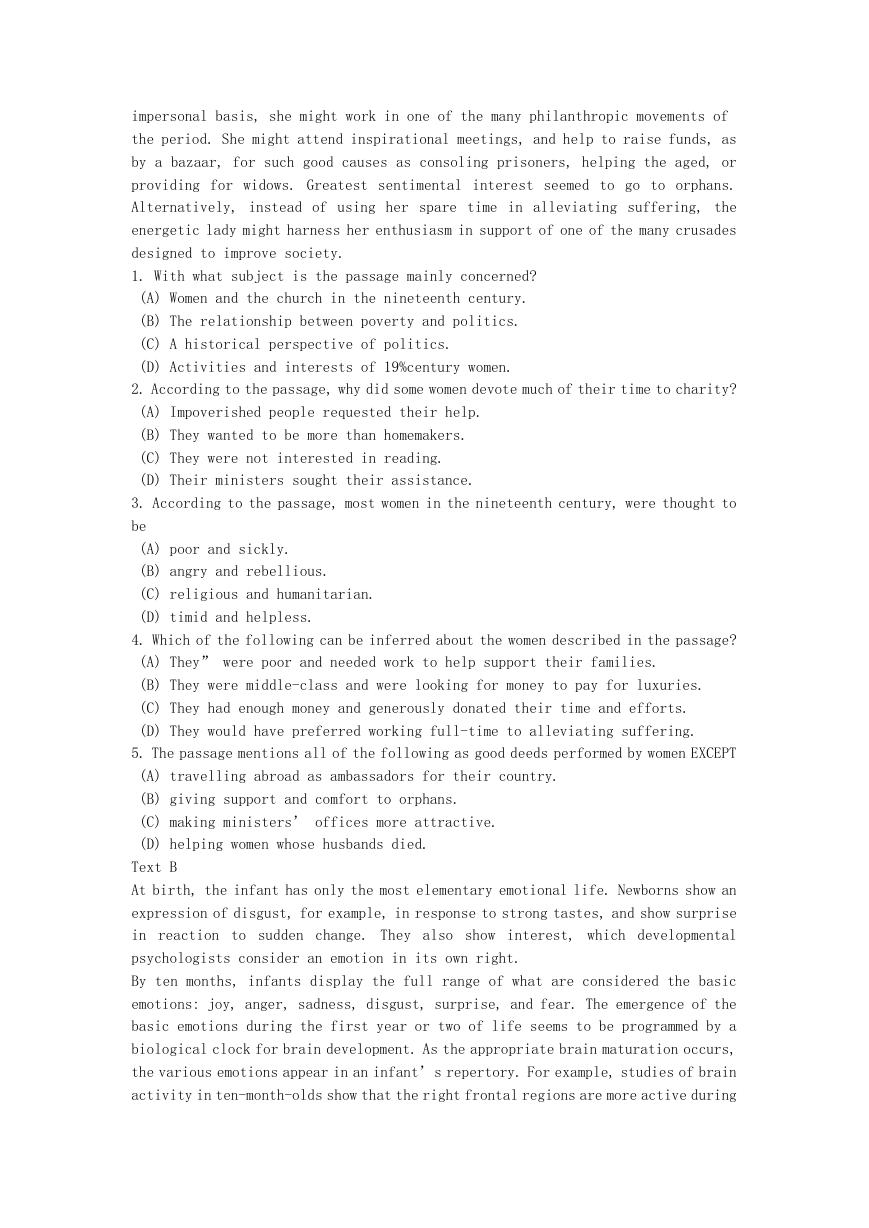
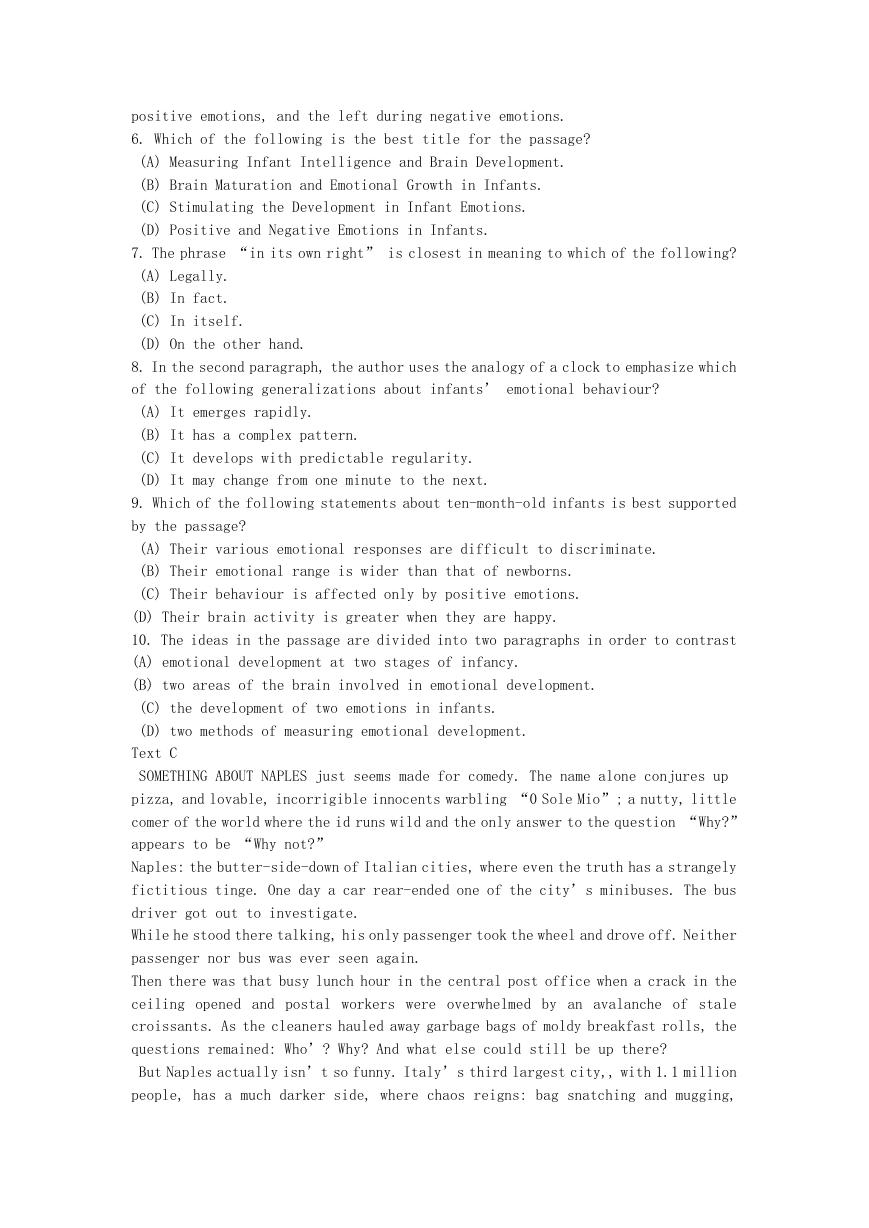
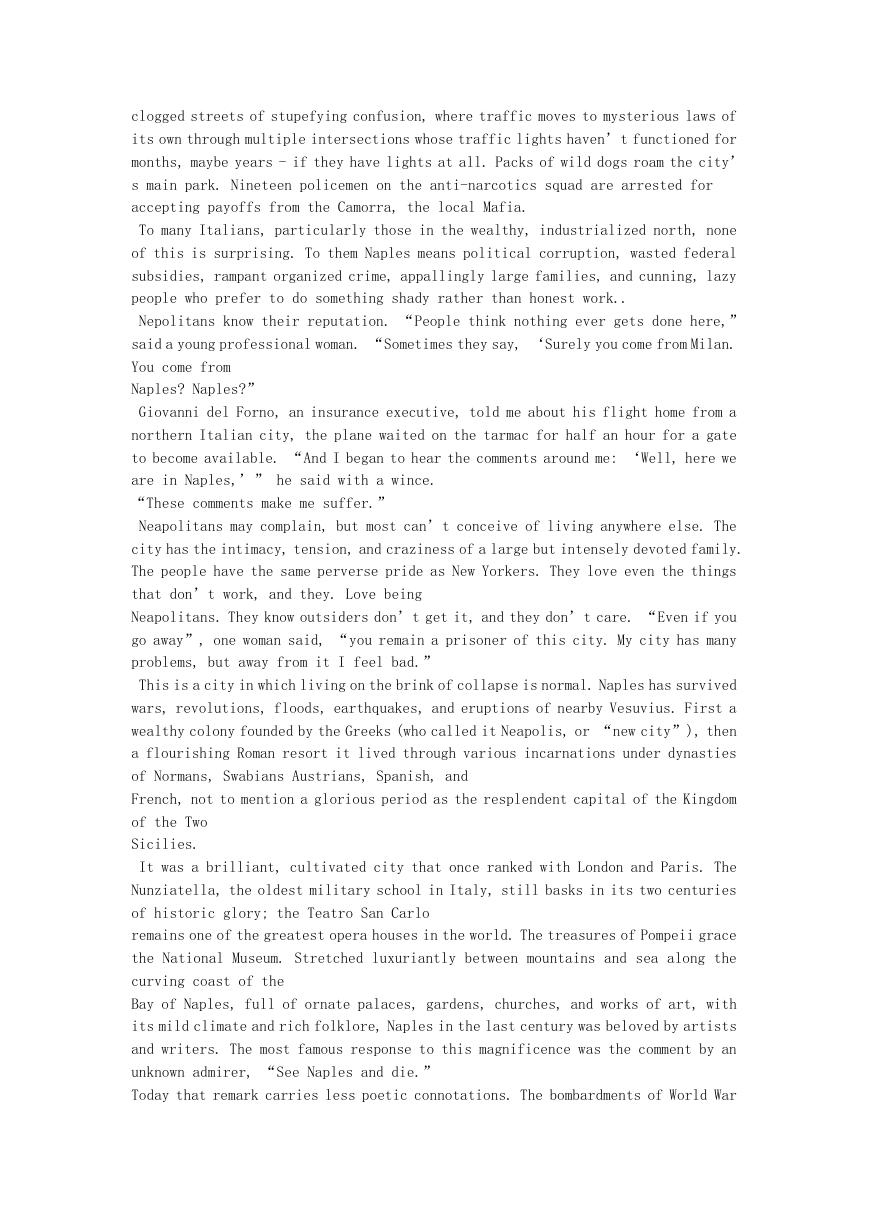
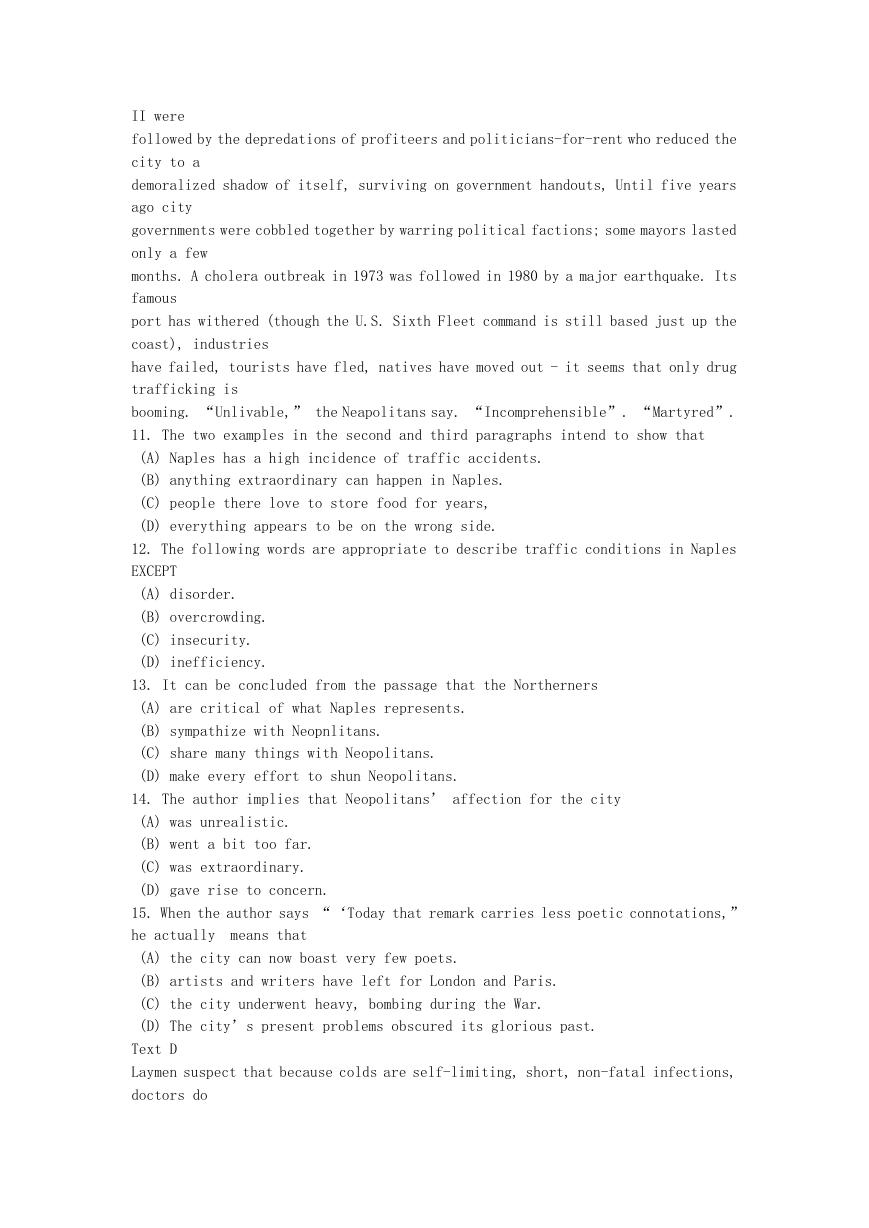
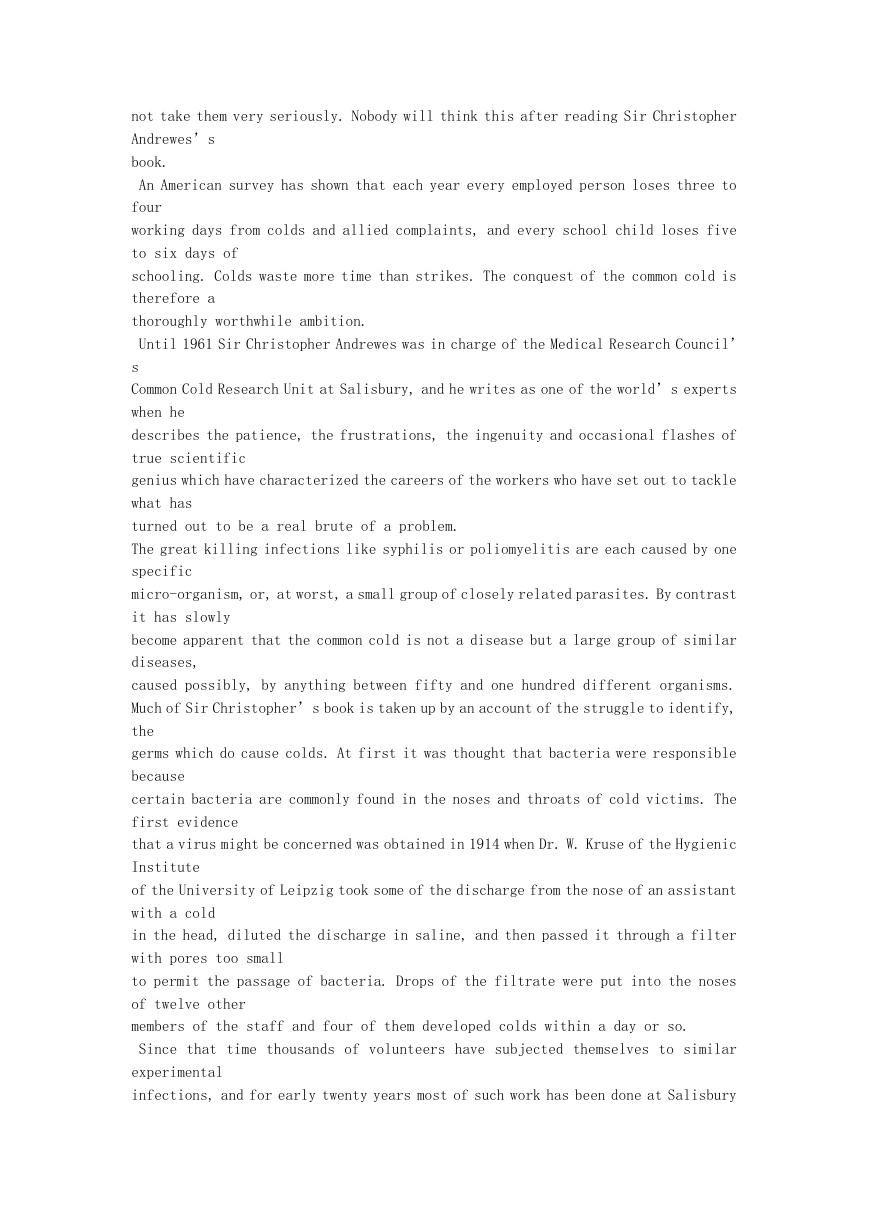








 2023年江西萍乡中考道德与法治真题及答案.doc
2023年江西萍乡中考道德与法治真题及答案.doc 2012年重庆南川中考生物真题及答案.doc
2012年重庆南川中考生物真题及答案.doc 2013年江西师范大学地理学综合及文艺理论基础考研真题.doc
2013年江西师范大学地理学综合及文艺理论基础考研真题.doc 2020年四川甘孜小升初语文真题及答案I卷.doc
2020年四川甘孜小升初语文真题及答案I卷.doc 2020年注册岩土工程师专业基础考试真题及答案.doc
2020年注册岩土工程师专业基础考试真题及答案.doc 2023-2024学年福建省厦门市九年级上学期数学月考试题及答案.doc
2023-2024学年福建省厦门市九年级上学期数学月考试题及答案.doc 2021-2022学年辽宁省沈阳市大东区九年级上学期语文期末试题及答案.doc
2021-2022学年辽宁省沈阳市大东区九年级上学期语文期末试题及答案.doc 2022-2023学年北京东城区初三第一学期物理期末试卷及答案.doc
2022-2023学年北京东城区初三第一学期物理期末试卷及答案.doc 2018上半年江西教师资格初中地理学科知识与教学能力真题及答案.doc
2018上半年江西教师资格初中地理学科知识与教学能力真题及答案.doc 2012年河北国家公务员申论考试真题及答案-省级.doc
2012年河北国家公务员申论考试真题及答案-省级.doc 2020-2021学年江苏省扬州市江都区邵樊片九年级上学期数学第一次质量检测试题及答案.doc
2020-2021学年江苏省扬州市江都区邵樊片九年级上学期数学第一次质量检测试题及答案.doc 2022下半年黑龙江教师资格证中学综合素质真题及答案.doc
2022下半年黑龙江教师资格证中学综合素质真题及答案.doc